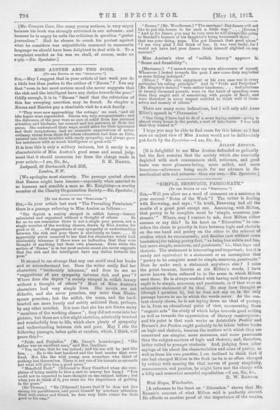MISS AUSTEN AND THE POOR.
[TO THE EDITOR OP THE " SPECTATOR."]
SIE,—May I suggest that in your article of last week yen do a little less than justice to the author of "Emma "P You say that " even in her most serious mood she never suggests that the rich and the intelligent have any duties towards the poor." Oddly enough, it is in "Emma" itself that the refutation of this too sweeping assertion may be found. In chapter x. Emma and Harriet pay a charitable visit to a sick family.
"'They were now approaching the cottage,' we road, 'and all idle topics were superseded. Emma was very compassionate and the distresses of the poor were as sure of relief from her personal attention and kindness, her counsel and her patience, as from her purse. She understood their ways, could allow for their ignorance and their temptations, had no romantic expectations of extra- ordinary virtue from those for whom education had done so little, entered into their troubles with ready sympathy, and always gave her assistance with as much intelligence as good-will.'"
It is true this is only a solitary instance, but it surely is so characteristic of Miss Austen's good sense and sound judg- ment that it should exonerate her from the charge made in your article.—I am, Sir, &c., S. H. HAMER. Ladywell, 69 Dartmouth Park Hai, London, N.W.
[We apologize most sincerely. The passage quoted shows that Emma might have become—especially when married to so humane and sensible a man as Mr. Knightley—a worthy member of the Charity Organization Society.—En. Spectator.]










































 Previous page
Previous page